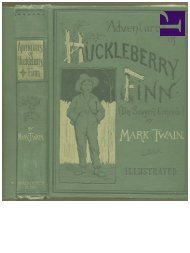Create successful ePaper yourself
Turn your PDF publications into a flip-book with our unique Google optimized e-Paper software.
“Were you ever a model?”<br />
“No,” said Hollis.<br />
“I was,” said Meredith, “for two years. I had a booker who loved using me. That’s the<br />
key, really, your booker. New York, L.A., all over western Europe, home to Australia for<br />
more work, back to New York, back here. Intensely nomadic. George says more so than<br />
being in a band. You can cope, when you’re seventeen, even when you’ve no money.<br />
Almost literally no money. I lived here, one winter, in a monthly-rent hotel room with<br />
three other girls. Hot plate, tiny fridge. Eighty euros a week ‘pocket money.’ That was<br />
what they called it. That was to live on. I couldn’t afford an Orange Card for the Métro. I<br />
walked everywhere. I was in Vogue, but I couldn’t afford to buy a copy. Fees were<br />
almost entirely eaten up before the checks found me, and the checks were always late.<br />
That’s the way it works, if you’re just another foot soldier, which is what I was. I slept on<br />
couches in New York, the floor of an apartment with no electricity in Milan. It became<br />
apparent to me that the industry was grossly, baroquely dysfunctional.”<br />
“Modeling?”<br />
“Fashion. The people I met who I most got on with, aside from some of the other girls,<br />
were stylists, people who finessed little bits of trim for the shoots, adjusted things,<br />
sourced antiques, props. Some of them had been to very good art schools, and it had put<br />
them off, profoundly. They didn’t want to be what they’d been groomed to be, and really<br />
it’s the nature of that system that not that many people can, ever. But they came out with<br />
brilliant skill sets for being stylists. And art school had made them masters of a kind of<br />
systems analysis. Extremely good at figuring out how an industry really runs, what the<br />
real products are. Which they did constantly, without really being that aware of doing it.<br />
And I listened to them. And all of them were pickers.”<br />
Hollis nodded, remembering Pamela explaining the term.<br />
“Constantly finding things. Value in rubbish. That ability to distinguish one thing from<br />
another. The eye for detail. And knowing where to sell it on, of course. I began to acquire<br />
that, watching, listening. Loved that, really. Meanwhile, I wore out runners, walking.”<br />
“Here?”<br />
“All over. Lot of Milan. Listening to stylists absently lecture on the fundamental<br />
dysfunction of the fashion industry. What my friends and I were going through as models<br />
was just a reflection of something bigger, broader. Everyone was waiting for their check.<br />
The whole industry wobbles along, really, like a shopping cart with a missing wheel. You<br />
can only keep it moving if you lean on it a certain way and keep pushing, but if you stop,<br />
it tips over. Season to season, show to show, you keep it moving.”<br />
Which reminded Hollis of a Curfew tour, though she didn’t say so. She took a sip of<br />
the unsweetened Americain, which was cooling, and listened.<br />
“My grandmother died, I’m the only grandchild, she left a bit of money. My booker<br />
was leaving the agency, getting out of the business. I applied to Cordwainers College,<br />
London College of Fashion, accessories and footwear. Done with modeling. It was the



